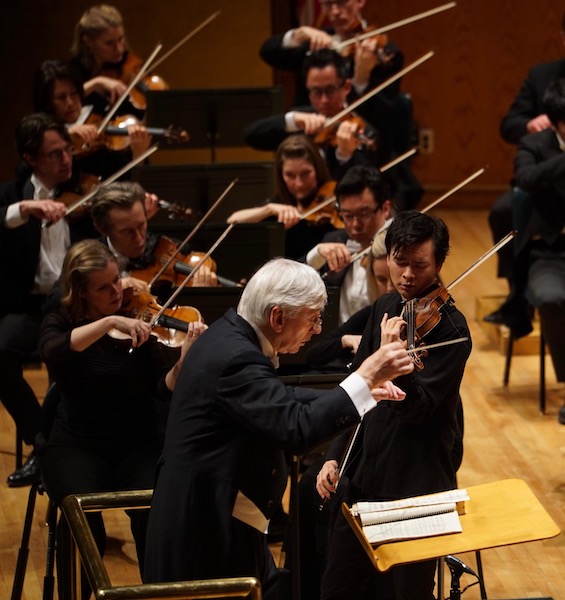Jackiw brings individual illumination to Brahms concerto with Utah Symphony

Stefan Jackiw performed Brahms’ Violin Concerto with Mario Venzago and the Utah Symphony Friday night. Photo: Kathleen Sykes
The Utah Symphony presented a program of exclusively Romantic-era music Friday night at Abravanel Hall. The performance took place under the baton of Swiss guest conductor Mario Venzago, and featured soloist Stefan Jackiw performing the popular Brahms Violin Concerto.
Much of the evening’s music originated as works for the opera or theater including the opener, Beethoven’s Leonore Overture No. 2. Despite the numerical label, this was Beethoven’s original version of his four overtures for his sole opera. The work was composed during Beethoven’s transition to a more romantic style, and this music is a prime example with sustained periods of extreme intensity and dynamic energy. Under Venzago, the orchestra delivered what the score demanded with precise intonation and a remarkable array of dynamics.
With his polished technique, luminous tone and graceful phrasing, Stefan Jackiw was able to effectively bring his own unique insights to Brahms’ familiar concerto.
Within the opening moments of his entry in the Brahms Violin Concerto it became obvious that Stefan Jackiw’s technique is comparable to that of the top soloists. The opening arpeggiated flurries were remarkably precise. Soon after was a lyrical section where it became clear that Jackiw’s tone and phrasing matched his technical skill.
This was especially apparent in the Adagio, where his delicate bowing and soaring expression captivated the audience. Throughout the sounds ranged from gentle to forceful and were expressed with an understated but confident air of excellence, culminating in an exhilarating finale. The audience responded with an enthusiastic and sustained standing ovation.
Venzago’s accompaniment was on the same level, with precise balance achieved between the orchestra and the soloist, making for a more powerful partnership and overall impact.
Following the intermission, Venzago returned with the orchestra to present a trio of works by Liszt, Sibelius and Verdi. Overall the mood here was lighter and more playful. Venzago is not a flashy conductor but he proved a savvy and effective musician on the podium.
Liszt’s Hungarian Rhapsody No. 4. is a rich work with varying tempos and several expressive solos, and each were well executed by the orchestra’s capable principals.
Venzago and the Utah musicians delivered a captivating account of Sibelius’s Valse Triste, the final notes rendered with devastating delicacy. Verdi’s “Ballet for the Queen,” from Don Carlos, closed the concert with an appropriate gusto.
The program will be repeated 7:30 p.m. Saturday in Abravanel Hall. utahsymphony.org; 801-355-2787.
Matt Starling is a composer, performer, music educator, audio engineer and founder of the Salt Lake Electric Ensemble, a group dedicated to the performance and recording of contemporary electro-acoustic music. He holds a bachelor of music degree from the University of Utah and a master’s degree in music technology from IUPUI in Indianapolis.